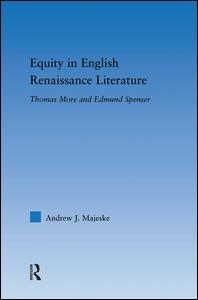Description
Equity in English Renaissance Literature
Thomas More and Edmund Spenser
Literary Criticism and Cultural Theory Series
Author: Majeske Andrew
Language: English
Keywords
lesbian; rule; jurisdiction; spensers; treatment; defective; nature; faerie; queene; absolute; Capital Punishment; Pardon Power; Spenser’s Treatment; Faerie Queene; Equity Jurisdiction; King’s Prerogative Power; Plato’s Laws; Chancery Court; Lesbian Rule; Equitable Persons; Absolute Communism; Aristotelian Equity; Isis Church; Athenian Stranger; Extreme Justice; Oligarchic Elements; Women’s Rule; Priest’s Interpretation; Britomart’s Dream; Real World Justice; Busirane’s House; Moderate Puritan; Book III; Elizabethan Succession; Classical Greek Concept
Publication date: 06-2014
Support: Print on demand
Publication date: 11-2006
· 15.2x22.9 cm · Hardback
Description
/li>Contents
/li>Biography
/li>
This book accounts for the previously inadequately explained transformation in the meaning of equity in sixteenth century England, a transformation which, intriguingly, first comes to light in literary texts rather than political or legal treatises. The book address the two principal literary works in which the transformation becomes apparent, Thomas More's Utopia and Edmund Spenser's Faerie Queene, and sketches the history of equity to its roots in the Greek concept of epieikeia, uncovering along the way both previously unexplained distinctions, and a long-obscured esoteric meaning. These rediscoveries, when brought to bear upon the Utopia and Faerie Queene, illuminate critical though relatively neglected textual passages that have long puzzled scholars.




